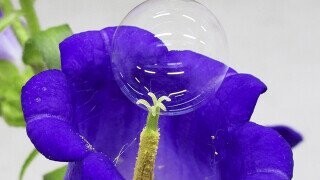We're Using Soap Bubbles To Pollinate Pear Trees

On the first day of Christmas, my true love gave to me
A partridge in a pear tree
Welcome to the 12 Days of Cracked-mas! In our continued quest to dig up weird facts about every possible topic, we set our eyes on "The Twelve Days of Christmas," that maddening carol about a series of items that in no way make for good Christmas gifts. We'll have something to say about each gift, because there's something interesting to say about everything ever.
If someone ever gives you a partridge in a pear tree, you'll be disappointed when you notice no pears seem to be growing from your tree. A pear tree only bears fruit when it's been pollinated, which means there has to be a second pear tree nearby. This second tree also has to be a different variety—if your true love gives you 12 pear trees, one on each day, they still won't able to fertilize one another's flowers if they're all the same type.
Don't Miss
If you do have a bunch of different varieties, you can get yourself some pears, but pollination might still be tricky. Bees are supposed to handle it, but as you might have heard, bees have been slacking off lately. Without insects doing the job, we need another way.
You can't just blast pollen in the trees' general direction. You can employ people to fertilize flowers one by one with brushes, but that's a lot of work. Scientists have experimented with drones, but if the drone hits the flower too hard, that's game over.
Japanese scientists have found a possible solution: soap bubbles. Bubbles can carry pollen, and when they collide with a flower, they pop harmlessly without slamming the flower at all. Soap can damage flowers chemically, but a new kind manages to get around that problem.
When the Japan Advanced Institute of Science and Technology tried aiming a bubble gun at a pear tree orchard, 95% of the flowers got pollinated, which is just as good as pollinating by hand but much easier. The next step will be drones—not drones that pollinate the directly but drones armed with their own flying bubble guns.
Some pear trees grow much more easily than the one from this experiment, Pyrus bretschneideri. The Bradford pear, for example, pollinates so easily that it needs no help at all. Problem is, it grows so much that it's an invasive species. And its pears are too full of cyanide seeds to be edible. Oh, and their flowers smell like semen.
Top image: Xi Yang, et al.
